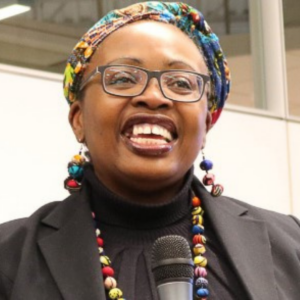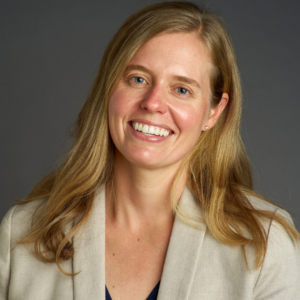Humentum’s earlier OpEx365 Retreats—Making Room for Innovation: Reassembling our World of Work—brought global development professionals together to explore ways to define the nonprofits of the future. Led by our Retreat Facilitator, Maggie Chumbley, the final gathering featured a discussion with Dr. Dorothy Nyambi, CEO of MEDA, who dived into how the sector can move forward post COVID-19.
This is an abridged transcript of Dr. Nyambi’s insights and perspectives from that conversation.
Maggie: What unique perspective do you think you bring to the discussion Dr. Nyambi?
Dr. Nyambi: I come with three distinct “M”s: First, I’m a mother, I have three children, and I feel like that’s a really important qualification that I bring to this conversation because parenting is a unique education in itself. The second “M” is, I’m a medical doctor. And the third “M”, I see myself as a manager—in life, no matter what we do, we’re always trying to manage.
I started my career as a medical doctor and moved into management at several international development organizations like Right to Play International and the African Institute for Mathematical Sciences. Today, I’m really humbled to be leading a team of wonderful colleagues at MEDA, an organization focused on economic development and using business solutions to address global poverty.
Maggie: From your point of view, what can this sector do moving forward from the chaos of 2020?
Dr. Nyambi: It’s been more than a year, and we are still predominantly in shutdown mode in our sector. I think, like with anything chaotic, there are always opportunities. So that’s why I preface this by saying I’m a mother and when you are a parent there’s always chaos. There’s chaos in the home with the children, and how do we go through that? We don’t just “snap back” in our homes, in our personal lives, or in our relationships.
Let us respect people’s lived experience. Let us not snap back. Let’s build back differently to be sure we build back better.
This past year, while chaotic, has given us two big opportunities. First, we have slowed down and reflected and that has been really important. Second, we have been forced to ask, “how do we move forward and prevent returning to how things were?” We have to acknowledge some of the ways we worked in the past were not ideal, not productive, and those elements we need to leave behind. As northern based iNGOs, we are not ‘saviors’ and that is a major mentality of the sector we need to work to leave behind. It means giving up power and sharing power with others. It means realizing we are not ‘the experts’—the experts of poverty are those who are living through poverty. We have to ‘listen and hear’ them. Let them drive the nature of interventions that would work for them. Let us respect people’s lived experience. Let us not snap back. Let’s build back differently to be sure we build back better.
Maggie: When we spoke before, you brought up the term, snap back, and I remember you saying, “As a leader, all I do is manage for the snap back.” Could you talk a little bit more about that?
Dr. Nyambi: In the development sector, the greatest risk is snapping back to old ways. I have reflected, and by snap back, I mean that our perspective is centered on our ability to maintain power, or relinquish some of it, or sharing the structures that have allowed us to exist in our ecosystem in a certain way.
When we think about building back differently, we have to think about what power we bring when we want to go back to business-as-usual. What power do we need to share for decision making or developing programs? What power dynamics are key points of our vision as we think about recovery during and after this chaos / opportunity.


